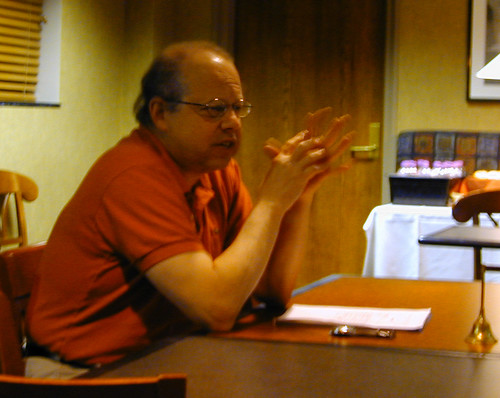Ira Smolensky has, for lo, these past many years, hosted and moderated the meetings of Great Decisions at Monmouth College. He did not miss the opener, this year.
Dr. William Urban kicked off the season with a discussion of U.N. Reform. He came well-armed for a fight, but it seems that we quickly came to the consensus that (a) the UN was in need of major reforms and repairs, and (b) Bolton and the current administration seem to be doing pretty much what needs doing.
Nevertheless, Urban made an unusual -- but, IMO apt -- analogy: The UN is a lot like our government in Springfield/Chicago, with much of its controls from a handful of elite groups & individuals, cronies, and long-term politicos. (We can say that Europe, Russia, China and the US, or perhaps Arab alliances would be the Cook/Will/Lake, etc. county parallels). If you ain't one of them, you ain't gettin' nuttin but crumbs from the princes' tables. So, places like Brazil, Israel, etc, who don't have a lot of other friends in low places, are like us out here in Forgottonia, (lucky to have gotten state & federal funding for HWY 34, 30 years ago), while Chicago-Russia continues to suck all the rest of the system dry.
He discussed this in some detail, especially over the trade-off of nations' votes re: anti-apartheid votes against South Africa and anti-Zionist votes against Israel. In essence, the game assures that the corrupt will continue to have great power in an organization formed by idealism, but run by cynics. Urban pointed out that this same maneuvering technique was tried against us in the Kyoto Accord, but failed because we recognized it for what it was -- a deliberate attempt to undermine our economic and political strength. It was by no means in our best interests (or, for that matter, in the best interests of anybody who actually did serious business with America/Americans).
When the time came for questions and discussions, the topic very quickly strayed back onto the pathway of least science: Kyoto Accord. It seems that there are still people who believe that the deal would have been good for the entire world, as it crippled our industry and trade. sigh.
A lively debate arose over how best to raise up those nations which are consistently dependent upon external aid for their populations' survivals, and several texts were mentioned, each with a different label for encouraging democratic reform and small-scale investment (lending money to individuals in, say, Ethiopia, to start their own small industries). Nobody mentioned the Bush Doctrine, although it came to my mind almost immediately after I lowered myself into the car on my way home... I always seem to think fastest when I'm typing.
At any rate, the evening ended on a polite -- even cheerful -- note, about three minutes before 9 o'clock.
It's funny how a topic like the UN, so controversial, could have gained such quick, non-constructive consensus among folks of all education levels, and had us spending so much time discussing irrelevancies. Much like the UN itself, I guess.

No comments:
Post a Comment